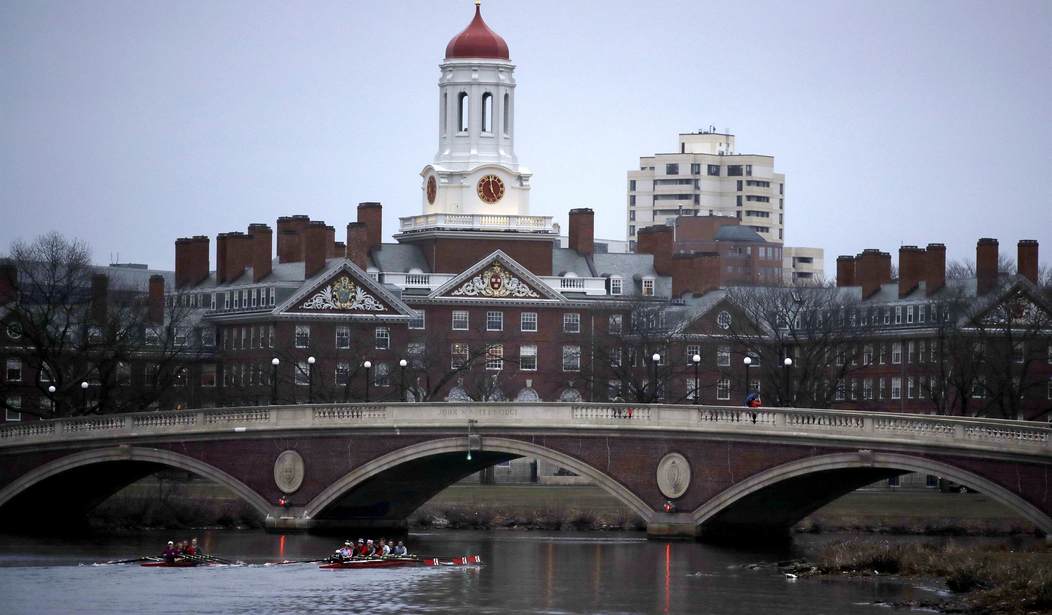What could it be? The spiraling costs, year after year, with massive overhead and bureaucratic costs soaring? The collapse in competence and civil knowledge? The lunatic, fringe, cultish partisan and ideological indoctrination? Maybe a bit of all the above, and then some. Like so many other institutions across American society, trust in American higher education is crashing. Though there's one notable demographic exception. Gosh, I wonder why:
Confidence in American higher education has hit a new low.
— Steve McGuire (@sfmcguire79) July 11, 2023
Democrats are the only group with majority confidence in it. pic.twitter.com/MEhElYzNto
As recently as 2015, a majority of the public held a "great deal" or "quite a lot" of confidence American higher education. One-third had "some" confidence. Just nine percent had "very little." Less than a decade later, barely over one-third of Americans hold one of the first two positions. The "some" category has ballooned to a 40 percent plurality, and "very little" has more than doubled to 22 percent. In the second slide, you'll see erosion across literally every demographic polled, including a slide of nine points among Democrats. But overall, Democrats -- by far -- hold American higher education in the highest regard, compared to literally everyone else. Indoctrination is more appealing if the inculcation in question is on behalf of your own biases, I suppose.
By contrast, just under one-third of independents share Democrats' confidence, a 16-point slide in eight years. Among Republicans, positive thoughts have fallen off a cliff, from a 56 percent majority to a small 19-point minority. Will any adjustments be made, or will the high priests of the ivory tower whistle past the graveyard, just as their fellow so-called progressives who dominate the 'news' media have done, as faith in their industry's work has circled the toilet bowl? Well, at least these schools won't be able to legally discriminate based on race anymore, much to their 'progressive' chagrin -- which might actually improve the academy's collective image, given public opinion on the matter. Nevertheless, it may prove very difficult for some of these colleges and universities to quit their demented addiction to racial segregation and discrimination. Consider this story out of one of the country's most expensive private schools, collaborating with public school parents, in the heart of deep blue New York City:
Recommended
NEW: NYU hosted a whites-only "anti-racism" workshop for public school parents in New York City, barring minorities from a five-months-long seminar that legal experts say was a brazen violation of civil rights law.
— Aaron Sibarium (@aaronsibarium) July 11, 2023
We have audio and video. 🧵https://t.co/PiFqBv4cqh
The all-white seminar, "From Integration to Anti-Racism," cost $360 to attend and met six times between February and June, according to a description of the program that has since been scrubbed from the university’s website without explanation. Organized by NYU’s Steinhardt School of Education, the workshop was "designed specifically for white public school parents" committed to "becoming anti-racist" and building "multiracial parent communities." But to promote solidarity with all races, participants were told, it was necessary that the seminar include only one. A few days before the first session, facilitators circulated a short handout, "Why a White Space," to explain "why we are meeting as white folks for these six months." The handout, produced by the nonprofit Alliance of White Anti-Racists Everywhere, argued that white people need spaces where they can "unlearn racism" without subjecting minorities to "undue trauma or pain."
When a parent questioned the premise of the workshop—saying it seemed "a little counterintuitive" to exclude minorities from an anti-racism seminar—Barbara Gross, the associate director of Steinhardt’s Education Justice Research group, assured her that it was for their own good. "People of color are dealing with racism all the time," Gross said. "Like every minute of every day. It’s a harm on top of a harm for them to hear our racist thoughts." The program took place while NYU was under an ongoing consent agreement with the U.S. Department of Education over a string of anti-Semitic incidents on campus..."They are literally running a ‘whites only’ program in the interest of so-called social justice," said Samantha Harris, an attorney who litigates campus speech and civil rights issues. "I find it inconceivable that the people putting these programs together don’t see the irony." NYU told the Free Beacon that it would be "reviewing these matters to determine whether they conform to our standards."
A 'whites only' segregated program, for "progress" and "anti-racism." Beyond parody, but totally unsurprising. Hence the polling results above. Part of the reason academia is unapologetic and aggressive about enforcing their political agenda on students is because they're committed above all else to influencing partisan outcomes. That, far more than meaningful education, is the goal of many of these faculty members and bureaucrats. We recently covered the evolving politics of younger voters, with older Millennials finally drifting rightward. While the youngest generation of voters remains broadly leftist in disposition, Democrats are starting to worry about their enthusiasm levels and commitment to turning out:
In 2020, Joe Biden scored a narrow Electoral College victory with a decisive assist from young voters. But as the president looks beyond his first term, many young voters are not satisfied, presenting a fresh challenge as he heads into a likely rematch with former President Donald Trump in 2024. Biden faces little risk of losing young Americans to Trump, who is far less popular among Gen Z and millennial voters. But can the president harness their anger to turn out and push him over the top? Or will their lack of perceived progress cause them to stay home, making way for a Trump victory next year? “The answer to this question will decide the election,” said John Della Volpe, polling director at the Harvard Kennedy School Institute of Politics, who specializes in young voter attitudes. In a recent blog post, Della Volpe wrote that voters under 30, who have been key to modern Democratic victories, now appear less likely to identify as Democrats, instead aligning as independents. Worse for the party, fewer young voters see politics as a “meaningful way to create change,” which he said has been a key indicator of youth turnout “Nearly every sign that made me confident in historic levels of youth participation in 2018, 2020, and 2022 — is now flashing red,” he wrote.
Apropos of nothing in particular, I'll leave you with this:
This is the 3rd time Biden has skipped a dinner with world leaders on an international trip.
— Alex Thompson (@AlexThomp) July 11, 2023
From the NYT last month:
"Still, after fatiguing days on the road, he skipped dinner with world leaders in Indonesia last year and again in Japan in May."https://t.co/HMq0iZp8gd https://t.co/0laR39XGwg pic.twitter.com/RWlfbKnlWn

























Join the conversation as a VIP Member